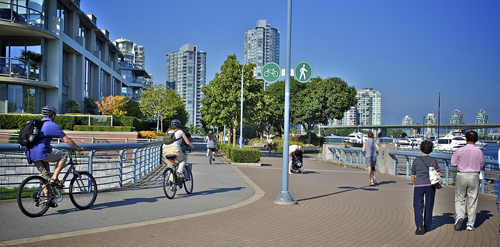Can we all just pause for a moment and give Vancouver a standing ovation?
The perennial contender for the title of world's most livable city has accomplished what Houston or Atlanta never even dream of: It has reduced traffic on its major thoroughfares even as its population has swelled. How did the city pull off this feat? The answer is intentionally, with smart policies.
In the 1970s, the people of Vancouver decided they wanted their city to be walkable and healthy. The city established a policy that it wouldn't widen any roads to accommodate more single-occupancy vehicles.
Vancouver was in better shape than the average U.S. city to begin with, because it's the only major city in North America with no freeways going through it. That meant the original street grid, constructed between 1880 and 1920, would have to suffice. To make that work, Vancouver worked hard to establish the kind of land use policies that would make living car-free a natural choice. The city prioritized walkable, mixed-use development and established a strong transit system with light rail, streetcars trolly buses, and rapid buses, as well as walking and biking connections.
And guess what? That strategy has worked exactly as planned. Vancouver officials recently trotted out traffic data to make the case for overhauling a traffic-heavy road by the waterfront into a street that prioritizes biking and walking while eliminating through traffic. The figures showed that on major streets, traffic has dropped 20 to 30 percent since 2006 -- although the city has grown 4.5 percent percent over that time. Pretty neat trick.
Here's the city chief transportation engineer, Jerry Dobrovolny, on the wider trend, as quoted in the terrific blog Price Tags:
We have seen a trend, a downward trend over the past 15 years – vehicles entering the city, vehicles entering the downtown, we have seen a downward trend on vehicles crossing the Burrard Bridge, we have seen a downward trend on vehicles entering and leaving [University of British Columbia].
So we’re seeing those continual drops city-wide.
Price Tags’ Gordon Price, a former city legislator in Vancouver, says every time a project is proposed for bikes or transit that reduces space for cars, there's an outcry. “They keep predicting intolerable gridlock,” he said. “And it never happens. You can be in downtown Vancouver and it’s not congested."
When you give people convenient transportation options that don't involve driving, like Vancouver has, they will make practical choices not to drive, Price said. Vancouver isn't the only place to demonstrate that transit-oriented growth can reduce traffic. Arlington County, Virginia, set off on a similar path in the 1970s, focusing development near Metro stations, and has seen traffic counts drop on major arterial roads even as population grows.
Vancouver's newest street transformation -- the creation of a waterfront biking and walking route by repurposing motor vehicle traffic lanes on Point Grey Road -- got approved by the city council last week. While the project faced intense opposition from people who believe traffic will be shunted to other streets, experience shows that this type of change will help people get around the city without driving.
"It’s the kind of city you get when land-use matches up with transportation priorities," writes Price. "And it’s the kind of city that’s healthier and ... maybe even happier."
"It’s the city we said we wanted – and the city we are getting."





